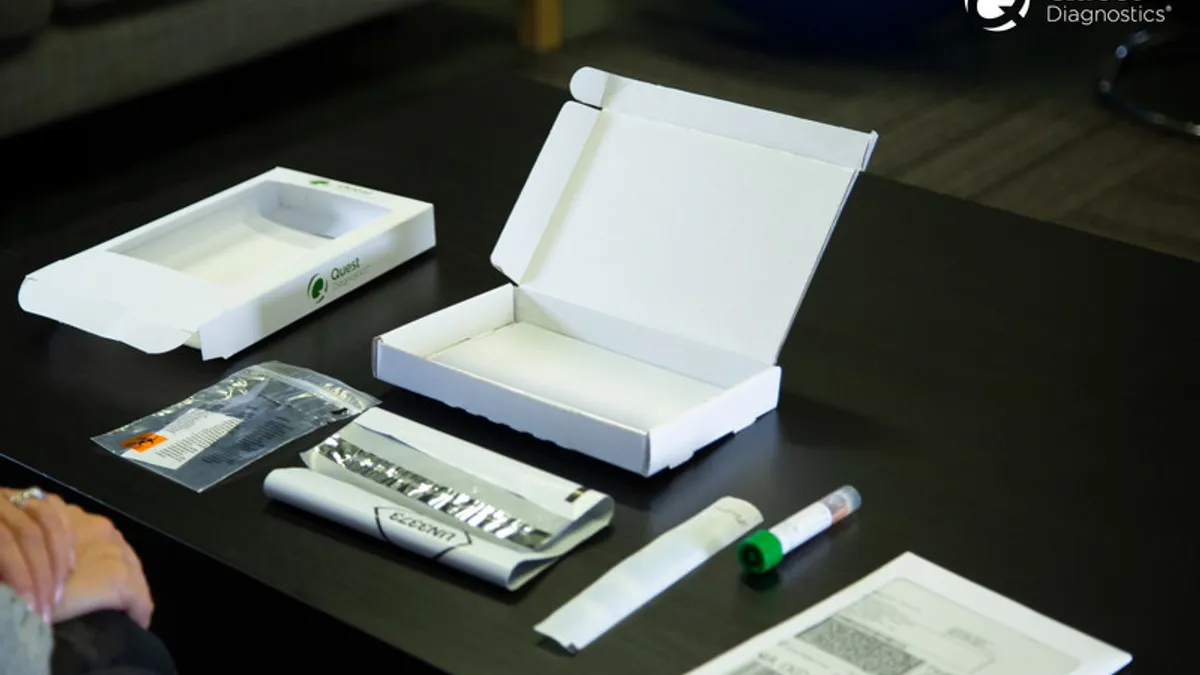Dive Brief:
-
Clinical lab network Quest Diagnostics and direct-to-consumer testing startup LetsGetChecked announced new emergency use authorizations Thursday and Friday for sample collection kits consumers can use at home and ship to labs, which then test the samples for presence of the coronavirus.
-
The two self-collection offerings will add hundreds of thousands of units to testing capacity, and follow earlier FDA OKs for nasal swab-based self-collection products from LabCorp and Everlywell, and saliva-based self-collection options from Rutgers and P23 Labs.
-
LetsGetChecked started selling the product for $129 on Thursday. Quest, on the other hand, is not yet launching the offering until June, and will first prioritize distribution of the test kits to healthcare workers and first responders before expanding to return-to-work services and general consumers.
Dive Insight:
After a special COVID-19 diagnostics policy appeared to prompt early confusion over how the agency would regulate direct-to-consumer testing services or at-home sample collection, FDA has expanded U.S. capacity for self-collection via emergency use authorizations to testing networks, direct-to-consumer companies, and individual labs.
Developers may offer a COVID-19 test for at-home self-collection under an emergency use authorization (EUA), or as part of an IRB-approved study, FDA clarified in an update Friday. The agency also added a voluntary EUA template to its website for labs and commercial manufacturers interested in at-home sample collection in a bid to streamline the process.
The latest EUAs will add a minimum of 800,000 of the self-collection kits into circulation between now and the end of June, according to projections by the two companies.
LetsGetChecked, founded in 2015, touted its product as the only one allowed by FDA that "owns all aspects of the testing service, including the collection kit manufacturing process, logistics, lab analysis and physician approval."
"With a current capacity of 300,000 units per week, LetsGetChecked’s own CLIA/CAP/BSL II certified high complexity laboratory based in Monrovia, California is building toward a capacity of millions per week in order to meet the demand of partners and individuals in all 50 states," the company said Friday.
Quest, on the other hand, is not yet launching its test kit, or at least not to consumers. The company did not specify what price it will charge for the test kit, only commenting to MedTech Dive that more details will come upon launching the test later in June.
The testing giant appears to be taking a similar distribution approach to competitor LabCorp, which was the first coronavirus test developer to receive FDA's backing for at-home sample collection.
Quest is initially prioritizing the self-collection kits, which can be used at home or in a healthcare setting, for individuals "critical to pandemic response," including healthcare workers and first responders. The company plans to make the kits available to states, return-to-work testing programs, and over time, through its QuestDirect consumer-initiated platform. LabCorp waited three weeks after announcing its self-collection EUA April 21 to say it was expanding the offering to its online Pixel consumer platform.
Rutgers was the first lab to receive FDA's OK for a saliva-based coronavirus test, and was later authorized to offer an at-home sample collection option. It's partnered with outside healthcare companies and telehealth suppliers, including Vault Health, Hims, Vitagene and ixLayer, to broaden test availability to consumers. Since then, Little Rock, Arkansas-based lab P23 also gained an EUA that in part allows for at-home saliva sample collection.
Another direct-to-consumer testing company, Everlywell, claimed the distinction of being the first company to receive an EUA for a standalone at-home sample collection kit that can be used with certain authorized tests.
Everlywell and Vault each said they do not profit from their offerings. Hims alluded to a similar structure, specifying that a little over half of the test kit's price goes to the lab to cover the cost of creating and processing the kits, about a third covers expedited shipping, and the rest covers medical providers' consultation and testing.
State of play: self-collection kits for use with coronavirus tests
| EUA-winning company or lab | Comments on capacity | Sample type | Results turnaround time | Price |
|---|---|---|---|---|
| LabCorp | As of May 12: Had 200K+ kits available, and "prepared to significantly expand capacity as required" | Nasal | * | $119 |
| Rutgers | As of May 29: Can process 20K per day and is looking at continued expansion up to 50K per day | Saliva | Hims says 3-5 days from time shipped to lab; Vault says 2-3 days after being received by lab | $150 from Hims and Vault Health |
| Everlywell | * | Nasal | Within 48 hours of sample being received by lab | $109 |
| P23 Labs | * | Saliva | * | * |
| Quest | As of May 28: Will have 500K+ kits available by end of June | Nasal | * | Not yet disclosed |
| LetsGetChecked | As of May 29: Current weekly capacity is 300K units, but building toward "millions" | Nasal | Within 24 hours of sample being received by lab | $129 |
*Information not yet obtained or unavailable











